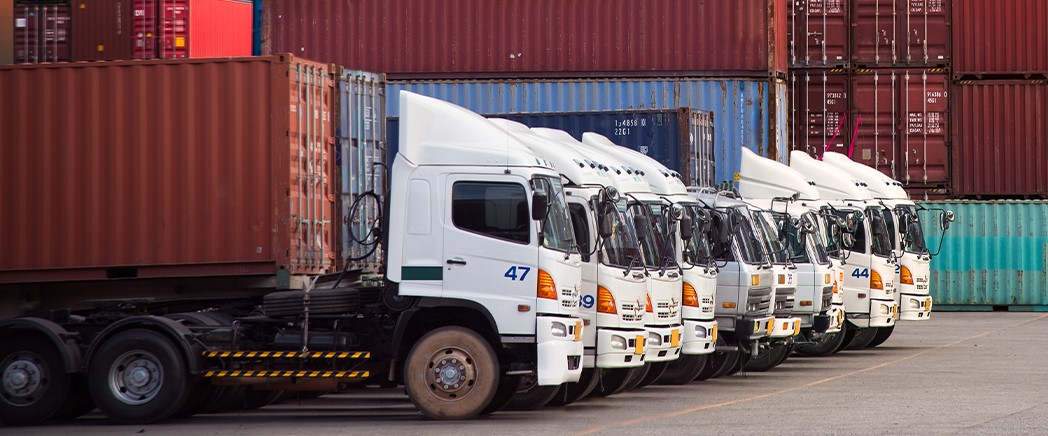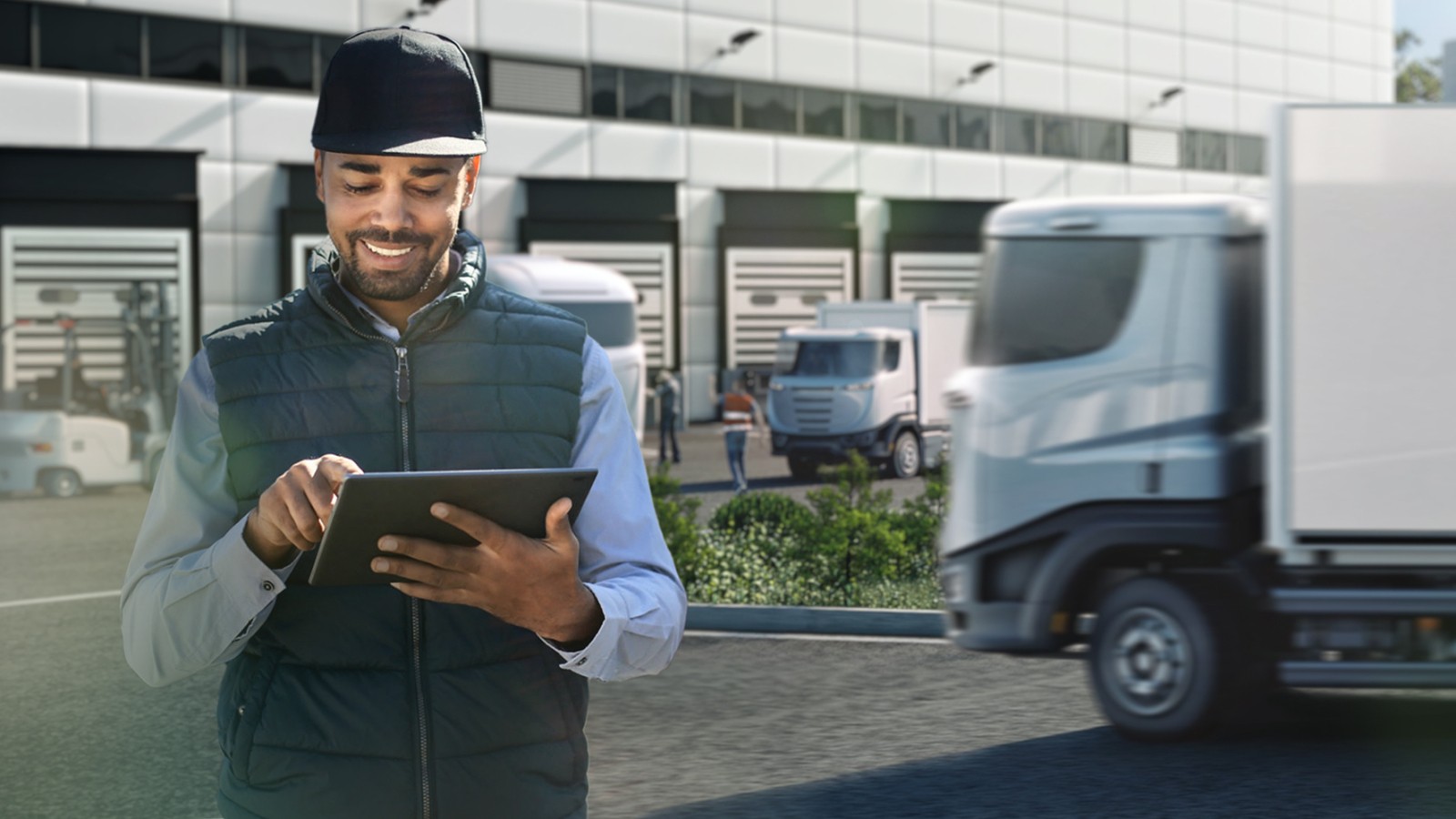This offer is currently only addressed to commercial customers. All prices are exclusive of goods and services tax (GST).
Vaibhav Ajmera
Unifying Logistics Sector With Bosch L.OS
Vaibhav Ajmera

The Indian logistics sector is a dynamic and bustling space - driven by immense potential but hampered by disorganization and fragmentation. With India's ambitious plans to become a global manufacturing hub in the next few years, the logistics market will have to heal the cracks that splinter the industry - by embracing technological advancements, optimizing resources, integrating robust supply chain facilities, investing in sustainable solutions and much more. Especially since the sector contributes an estimated 14% to the GDP, but also costs about 9 to 14%.
To boost India’s logistic prowess, the Government of India unveiled a National Logistics Policy (NLP) in September 2022. The Policy targets a reduction in costs to align with global benchmarks by 2030, while aiming to secure a top 25 ranking in the Logistics Performance Index (from its current position at 38) by the same year.
The NLP implements a data-driven support mechanism for efficient logistics optimization, with all signs pointing to a more cohesive approach for a sector that employs around 22-25 million people in India, powered by technology and digitization. However, obstacles still linger.
Challenges in the Logistics Sector - Why the Slowdown?
India is a land of extremes. And logistics is a true reflection of that statement, with fragmentation creating an unorganized sector dominated by few large players and a smattering of smaller ones. Unless all these disparate parts move in unison, the goal of increasing efficiency in the industry might become a pipe dream.
There are a few reasons for this current scenario:
- Independent, small, and scattered players make up a majority of the industry.
- Companies choose to work with legacy systems and are reluctant to embrace digitization.
- Focus on experience-based knowledge, instead of data and analytics-led decisions.
- A lack of understanding about the various available solutions and which one would work best.
It leads to a deficit in coordination, consistency, and economies of scale. Furthermore, the reliance on manual processes has resulted in inadequate data from vehicles, IT systems, and operational facilities. This can further add to the already burgeoning problems facing the sector
- Slow adoption of technology – While digital transformation is picking up pace, LSPs have been sluggish in incorporating tech solutions into their ecosystems – Possibly due to reluctance or a lack of resources. This could be IoT sensors, data management systems, artificial intelligence, cloud computing, or even a simple centralized dashboard for fleet analytics.
- Lack of visibility – Maintaining end-to-end visibility over the entire supply chain is a critical requirement for logistics players. However, most struggle with automation, vehicle maintenance, operations management, and expense management. Real-time monitoring often comes as an afterthought, thereby increasing throughput time.
- Poor data gathering – Many companies rely on archaic data gathering tools, which can introduce human error into the systems. Whether it is a lack of sensors, fleet management software, or even inventory management tools to deal with fluctuating consumer demand, logistics players are frequently left without the option of data-driven decisions.
- Safety – Operators might have weak safety protocols or training measures, which can leave your goods and personnel at increased risk. Countries like India have high road accidents and fatalities, often caused by driver behavior, driving conditions, grey/black spots, weak barriers, overloaded vehicles, and even wrong-side driving.
- Cost: Total cost of operation is increasing across the globe, which are further exacerbated by inefficient management and maintenance. Just the absence of simple route optimization tools can increase your fuel and resource costs, leading to a disrupted delivery schedule and unhappy customers.
- Sustainability concerns: Companies are dealing with mounting pressure from governments and non-profits to reduce their logistics carbon footprint and adopt viable measures. However, a lack of information and a failure to accept regulations can make companies wary of opting for sustainable steps.
- Interoperability – The logistics supply chain is a thriving ecosystem that depends on collaboration between different stakeholders. However, reliance on legacy systems and manual data gathering can prevent the seamless flow of information between organizations. This introduces inefficiencies into your operations, can duplicate efforts, and increase lead time.
While independent solutions to these problems exist, they can further drive a wedge between different stakeholders - acting as a temporary fix instead of a cure. What’s required is a strategic and unified approach that can address the many issues that plague the industry and offer a comprehensive solution.
Does this exist?
Yes.
Enter Bosch L.OS - Connecting you to an integrated logistics ecosystem.
Bosch L.OS, or Bosch Logistics Operating System, is a global platform that acts as a central hub between different stakeholders from the logistics industry - transportation companies, freight carriers, software suppliers, channel partners. It aims to build collaboration throughout the value chain, helping companies select and deploy the services/solutions that meet their specific needs through a centralized dashboard – even if you’re on certain legacy systems.
Bosch L.OS provides a thorough and transparent view of the entire supply chain through end-to-end integration of a variety of offerings, including fleet management, fuel optimization, maintenance mapping, routing and parking, and personnel management. These solutions are offered by our vast list of curated partners, which include new-age startups and legacy brands. The aim is to address the vulnerabilities of the logistics sector by helping customers operate efficiently and scale effortlessly:
- Transportation management: Track shipments, manage fleets, generate insights, measure performance, and streamline operations. End-to-end logistics management is made possible on the Bosch logistics platform.
- Fleet management – Monitor vehicles, equipment, and cargo with the help of connected logistics tools that offer fleet operators with real-time visibility of their vehicles. With toll management, load management, vehicle health checks, and other comprehensive solutions, stakeholders can stay competitive in an ever-changing industry.
- Hardware – Leverage IoT devices and sensors from different providers to improve the overall safety of your cargo and personnel. By monitoring driver behavior, location, vehicle speed, fuel, maintenance requirements, inventory, and much more, you can protect against any risk or misuse. Create truly-intelligent operations with smart hardware for real-time analytics.
- Routing and parking – A key component of efficient logistics is optimal routing for all your cargo and vehicles. Utilize smart solutions that provide the ideal route map for all your deliveries to reduce fuel consumption and remove vehicle idling. Complement this with smart parking solutions which can plan roadside vehicle parking in advance.
- Driver management - Find, train, and manage drivers, while ensuring the implementation of safety policies that reduce your risk outlook. Deploy driver tracking sensors that can add further layers of safety and guarantee driver compliance.
- Fuel and sustainability – A simple step in improving the efficiency of your supply chain ecosystem is real-time monitoring of fuel consumption across the fleet. With smarter routing and tracking mechanisms, you can ensure that your emissions stay low and your profits high.
- Warehouse management – Find the tools for end-to-end management of all warehouse processes. By leveraging cloud computing and edge-networks, you can keep track of all cargo movement with batch management, stock consolidation, gate management, and outbound planning.
- Logistics as a Service – Streamline and automate your operations with comprehensive solutions for supply chain management. Utilize transport and warehouse management tools, along with warehouse booking systems, for complete visibility of your ecosystem - a method to increase efficiency and reduce costs.
As a one-stop, cloud-based, destination for the logistics industry, Bosch L.OS allows for all stakeholders to work and scale together. These include,
- Independent Software Vendors (ISVs)
- Fleet Owners and LSPs
- Government Officials and Bodies
- Solution Providers
To see Bosch L.OS in action, you can read our case study on an Indian furnishing company - Arrivae.
If you’re ready to scale your business, reach out to us at bosch.digitalplatforms@in.bosch.com

